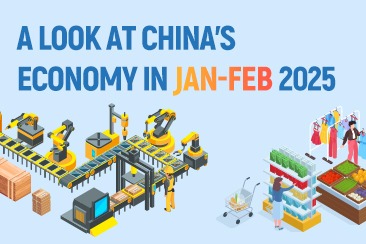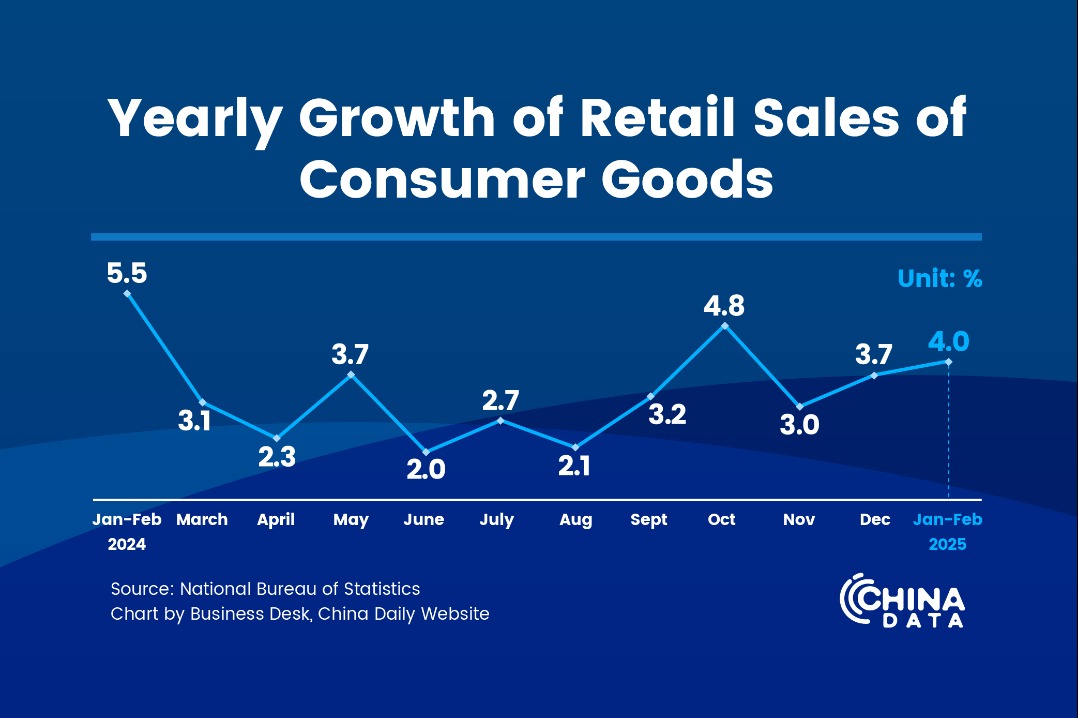Innovation, consumption key to growth

China is doubling down on technological innovation, particularly in areas like artificial intelligence and humanoid robots, to prop up economic vibrancy this year, hedge against escalating tariff threats from Washington, and counter sluggish domestic demand, senior economists said.
On top of the current consumption boosting-initiatives, policymakers could invest even more in consumer-centric stimulus measures and strengthen the social safety net, thus fostering a more enabling ecosystem where growing demand for high-tech products and services translates into stronger impetus for the country's innovation capabilities, they added.
"While the fiscal package — including the pro-consumption measures announced in the Government Work Report earlier this month — came as expected, what surprised us are the tech-focused initiatives," said Robin Xing, chief China economist at Morgan Stanley, in an exclusive interview with China Daily.
The world's second-largest economy has vowed to "establish a mechanism to increase funding for industries of the future" and "support the application of large-scale AI models and development of next-generation intelligent terminals and smart manufacturing terminals", as laid out in the report.
China has put in place a multichannel funding support plan, including a re-lending program, a State venture capital guidance fund and the upcoming "sci-tech board" in its bond market, for frontier sectors like AI, quantum computing and self-driving cars, Xing said.
These initiatives collectively would bring the total investment to nearly 1.5 trillion yuan ($207.3 billion), Xing said, adding that, "For the tech sector, the 'animal spirit' is back."
In late February, Chinese tech heavyweight Alibaba Group announced that it would invest more than 380 billion yuan in building cloud and AI hardware infrastructure in the next three years.
"The scale of the annual investment by Alibaba is equivalent to nearly 0.1 percent of China's GDP," said Yu Xiangrong, chief economist at Citigroup China.
The Alibaba investment plan and the increased expenditure by other tech firms, combined with the ripple effects across upstream and downstream enterprises, could lead to an additional 500 billion yuan in AI-driven spending. This, in turn, is expected to contribute about 0.4 percentage point to China's GDP growth, Yu said.
That said, for the property and consumer sectors — where business sentiment still remains modest — a stronger consumer-centric stimulus and deeper social security reforms are also advisable to underpin a more broad-based recovery, economists said.
"We believe that the higher-tier city real estate market will be able to stabilize and halt its downward trajectory in the latter half of 2025," said Yu. "This would gradually diminish, and even reverse, the real estate sector's drag on the overall economy. Once the real estate market finds its footing, the adverse wealth effect that has prevailed over the past few years can be mitigated, which will be instrumental in restoring consumer confidence."
In addition, the augmented fiscal deficit has been expanded by around 2 trillion yuan, about one-fourth of which will be consumption-related, including an expanded consumer trade-in program, wage hikes for civil servants and modest increases in social welfare spending, Xing said.
"China is trying something new — a more proactive fiscal policy with a greater focus on consumption — in order to reflate the economy. But it is not enough," Xing added.
Going forward, policymakers could deliver deeper social security reforms, such as easier access to public housing and healthcare for migrant workers, which will reduce people's precautionary saving habits and unleash huge consumption potential, Xing said.
"It's probably the central government's turn to try to fill the gap by either channeling dividends from State-owned capital to the social security system, or gradually shifting China's policy focus from supporting infrastructure to spending more on social welfare."
This will give people enough incentives to purchase high-tech products and services, and firms can sell their products at a better price. This in turn will be a more sustainable way of encouraging and promoting innovation in the country, Xing added.




































